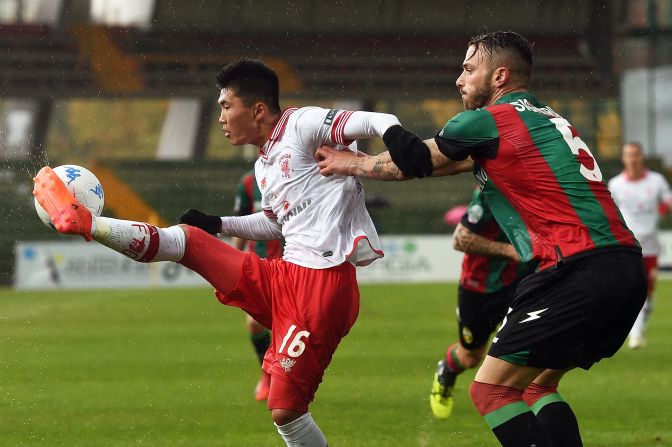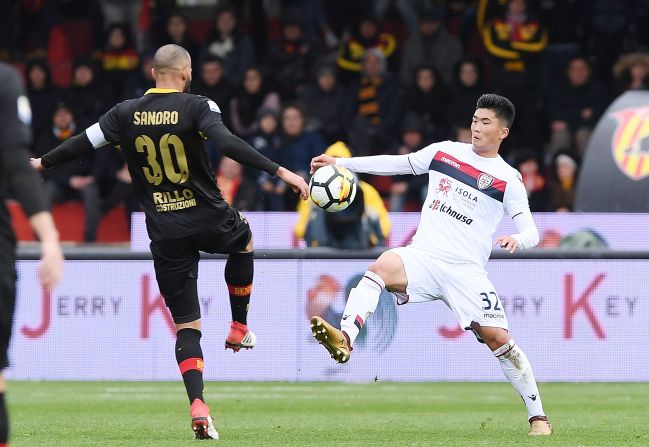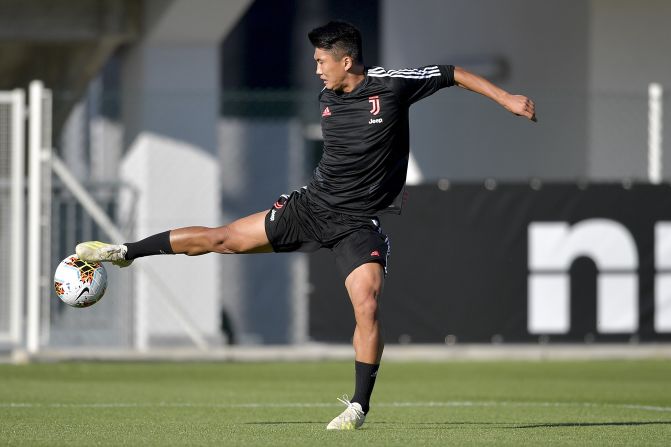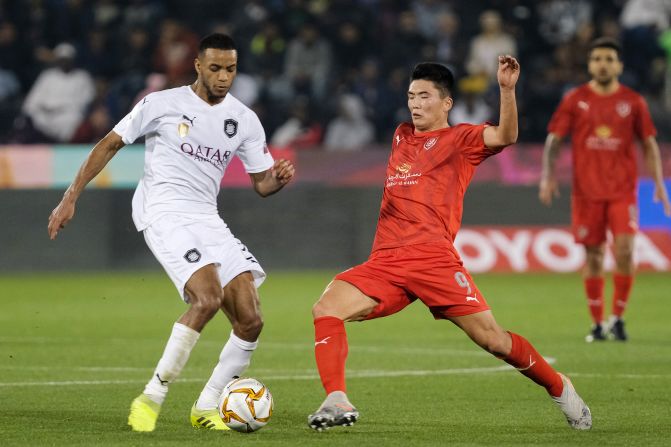In 2017, Han Kwang Song?became the first North Korean to score a goal in one of Europe’s five major soccer leagues?and even made a shock transfer to Italian giant Juventus in?2019, then later to Qatar’s Al-Duhail.
But his promising career was cut short when he disappeared from the world soccer stage in 2020, leaving fans with a question: “Where is that North Korean player?”
“The Little North Korean,” as an Italian commentator once described?him,?Han was not?especially?tall,?but with his scorching pace, strong tackling and lethal heading in front of goal was still capable of competing among Europe’s best.
The young striker from Pyongyang quickly drew attention from?soccer?pundits and fans – not just for his unique background, but for his technical prowess as well.
“His physique wasn’t big, but he was quick with his positioning and could score headers well,” South Korean?football?commentator Hahn June-hea told CNN Sport.
Han was praised back home as “a promising player who drew the attention of the European?football?world,” according to?North Korea’s propaganda media Sogwang.
But the good times didn’t last after the United Nations Security Council (UNSC) imposed sanctions against North Korea for conducting its sixth nuclear test in 2017.
The sanctions ordered member states to repatriate all North Korean nationals working in their respective jurisdictions amid concerns that foreign money was being transferred to support Kim Jong?Un’s nuclear and weapons programs.?The UNSC resolution set the end of 2019 as the deadline for repatriation.
But the Covid-19 pandemic led to North Korea fully sealing its borders, making it impossible for Han and fellow repatriated North Korean nationals to return home. He had been due to fly out of Qatar in 2021?in accordance with the UN sanctions?–?and?has since vanished.?A CNN investigation into his story has shed new light on his disappearance.
Pyongyang
Han was born in the North Korean capital of Pyongyang in 1998. Little is known about his life aside from his enrolment in the prestigious?Pyongyang International?Football?School?founded in accordance with Kim Jong?Un’s well-known love of sports.
When Kim took the reins of the regime in 2012, sport became a rare window into a country that is often hidden from the rest of the world.
The North Korean leader used?sports as?an exercise in?soft power, investing in elite sport to promote his country internationally and public sport to enhance defense and labor power,?according to South Korea’s unification ministry report.

North Korea began?to step up participation?in major international sporting events, including the 2012 Summer Olympics in London?and the 2018 Winter Olympics hosted by South Korea?– which technically remains at war with its northern neighbor.
At PyeongChang 2018, however, the two nations even marched together under the Korean Unification Flag during the Opening Ceremony and participated as a unified Korean team in women’s ice hockey. The opening of North Korea through sport seemed like a door that would not be closed any time soon.
“All sports are popular.?They followed the Olympics and?soccer,” former North Korean?men’s?soccer?national team head coach?J?rn Andersen told CNN Sport, adding that he had limited contact with the North Korean public during his time in Pyongyang between 2016 and 2018.
“There were some local TV channels – never live games – which would sometimes show European?soccer?in the week. Maybe one from the Bundesliga [in Germany], one from [Spain’s] La Liga, one from Italy, England … I think many watched,” Andersen explained of the sporting events that air on North Korean state broadcaster KCTV almost every day.
In 2013, Kim founded the?Pyongyang International?Football?School?in the capital’s Rungna Islet?to foster soccer talent, send students abroad, and host experts – representatives from world soccer governing body FIFA were?invited to Pyongyang in 2014?to help educate local teams and instructors – and soccer players?from overseas in an effort to raise the country’s standard in the sport?“to the world’s?level,”?according to state news agency KCNA.
The soccer school also featured?exclusive facilities and programs designed to help nurture young talent.
Just months after its founding, 14 students were sent abroad to Spain and 15 to Italy at the expense of the state to learn from established soccer clubs, according to Sogwang.?Amongst the many?who graduated from the prestigious elite program, Han Kwang?Song stood out the most.?

His national fame is apparent in a?YouTube video?published on a channel run by YuMi,?a vlogger experts?believe is likely related to high-ranking North Korean officials and?may be part of a propaganda campaign aimed at rebranding the country’s international image.
“I like Han. His skills are solid and he is very good at dribbling,” a Pyongyang citizen can be seen saying in Korean.
Han became the biggest success story from Kim’s efforts to turn the country into a?sports powerhouse when he was?recruited by Italian youth scouting center ISM Academy via its Talent Identification Program.
In 2015, the then ambitious teenager packed his bags for its base in Perugia – the capital of Italy’s central Umbria region, located about 105 miles north of Rome – alongside fellow North Korean prospect Choe Song?Hyok.
Move to Europe
At the ISM Academy, the pair joined young?footballers from across the globe, sharing the same dream of making it through the competitive pathway to the professional game in one of Europe’s top leagues.
The academy proudly shows a photo of Han on its website as a player who?“reached their goal and entered the world of professional?football.”?Also featured is Han’s friend?Choe, who went on to play for AC Perugia Calcio, which plays in Italy’s lower leagues.
Han spent at least a year at the academy before a successful try-out with the youth team of Cagliari. The move put him on the map and gave him regional recognition.
“I remember my director Mario Berreta said we had a North Korean trying out and asked me to see if he was good enough,” Cagliari’s then-under-19 coach Max Canzi told CNN Sport.
“I was kind of upset because we had an important match that Saturday,” Canzi said, recalling that he initially refused to see the player.
“He started training, and after 20 minutes, I looked at my assistant coach and said, ‘Tell Mario he has to come out. We have a problem – he’s very good.’”
Putting pen to paper, however, took longer than usual given what Canzi described as the “bureaucratic problems” and “voices going around.”
“Somebody in [the Italian] parliament even put out a question as to if it was the right thing to do because we [Italy] had an embargo against [signing contracts with] North Koreans,” he said.
But it turned out to be a worthwhile pursuit for Cagliari.
The North Korean striker, who joined the club’s youth team under Canzi in March 2017, quickly proved his value by scoring in his very first youth match, earning him an immediate promotion to the first team in Serie A,?according to Canzi.
Han headed in his first top-flight goal –?the first time a North Korean player had scored in one of Europe’s five major leagues –?just a week after his professional debut on April 2, 2017.
Han had arrived from North Korea not knowing how to speak English or Italian, but it didn’t take him long to adapt to Western culture – something forbidden in his homeland.
“At the beginning, it was not easy because he didn’t know English or Italian. But he learned Italian quite fast,” Canzi recalled to CNN?Sport.
Nicholas Pennington, a former Cagliari youth teammate, remembers Han as “a very, very good player” on the pitch and “a bit shy but really nice guy” off it.
“I?was one of the first to stop and speak to him and help him to integrate. I would pick him up in the car a few times and he came to training with me,” he told CNN?Sport.
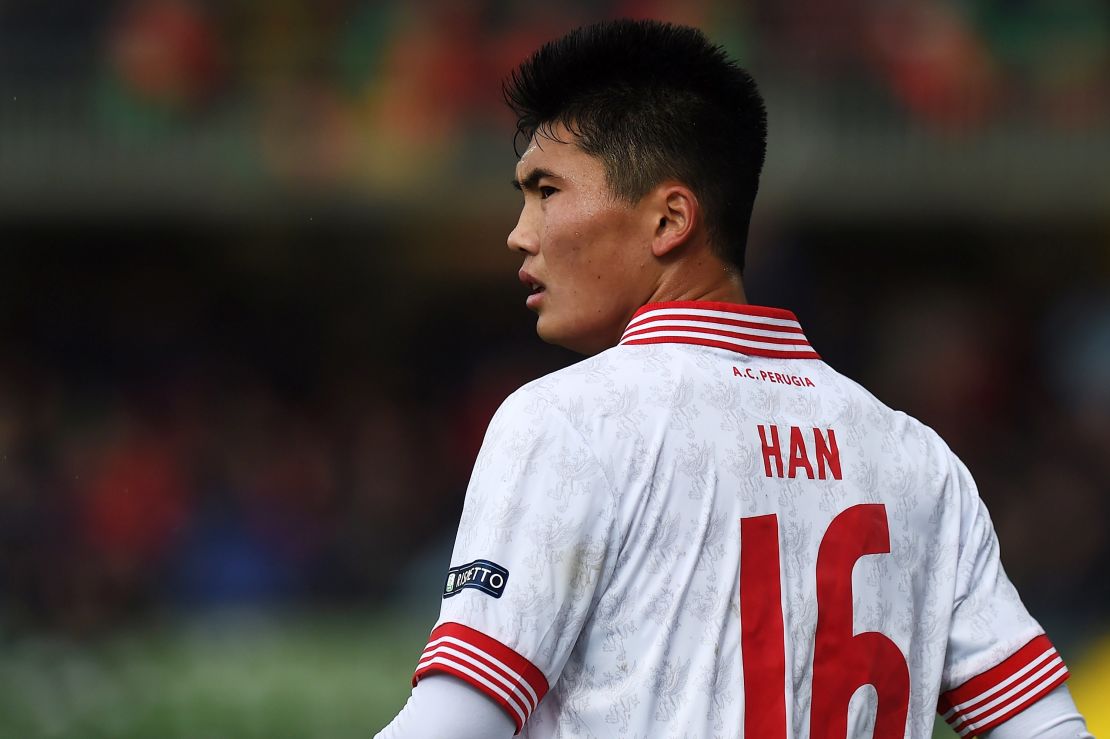
Pennington recalled asking Han and Choe about North Korea multiple times.
“But they really didn’t say anything. I think you could even see that they were a bit scared to say anything. They would say, ‘I don’t know,’ little things, but mostly very reserved and didn’t want to say anything about it,” he said.
Han also barely spoke about his family back in Pyongyang,?Pennington said.
“I remember [Han] talking about his family, saying his family was there, he misses them, he didn’t know when he gets to go home and see them, because obviously at the time I don’t think it was easy for him to just travel back home and travel back to Italy. I remember in my head thinking it’s crazy how little he says about back home compared to what I do,” he said.
Canzi, who lived in Seoul for three years as a child,?also said Han was “very shy, very polite.”
“When Han arrived for the first time, I used the few Korean words I knew and said annyeonghasaeyo [hello in Korean], and he said, ‘Wow, what’s happening here?’ And when he passed the water at our first meal, I said kamsahabnida [thank you in Korean],” Canzi said.
“Football?is strange, because when you play in a team and you’re a good player, everybody likes you. He arrived and everybody saw immediately how good a player he was,” Canzi remembers.
“Here in Cagliari, everybody loves me. I feel like I am at home,” Han?said in fluent Italian in a video posted by Cagliari?in 2018.
While under contract with Cagliari, Han was sent on loan stints to AC Perugia and to Juventus’ under-23s?before?Juventus?secured his shock transfer for?$3.74 million?(€3.5 million) in?January?2020, according to?Transfermarkt.
“That was quite a bargain for Cagliari because he arrived for nothing,” Canzi said.
“Yes, I was quite surprised [Juventus was interested]. I thought he was a very good player, but he was young and I couldn’t imagine how far he could go. We had some other players in the team quite similar to him that, of course, had a lot less news made [of them] because the fact that he was a North Korean was a big issue.”
Playing in Serie A was a milestone for Han but moving to the?Bianconeri?–?as fans call Juventus –?was an even bigger achievement.
“It has been a long way but finally I can say my dream came true [after] scoring my first goal in the Serie A and becoming the first North Korean to dress such an important shirt as Juventus. My dream came true!”?Han said in a written post via the ISM?International Scouting Center.

Han’s dream of wearing the famed black and white stripes, however, lasted only a week as Juventus subsequently?sold?him to Qatar’s Al-Duhail in?that same month?for a transfer fee of?$7.7 million?(€7 million),?according to a UNSC?report?of the Panel of Experts.
While Han was beginning his journey in the European top flight in 2017 – marking several milestones for North Korea –?his home nation was ramping up tensions on the Korean Peninsula by testing what it claimed as its first intercontinental ballistic missile.
Then on September 3,?2017,?the North carried out its sixth nuclear test, which prompted the UNSC to impose a list of sanctions over concerns that the reclusive nation’s?“ongoing nuclear- and ballistic missile-related activities have destabilized the region and beyond.”
The sanctions required all member states to stop providing work authorizations for North Korean nationals in their jurisdictions,?and three months later,?the UNSC additionally decided that all North Korean nationals working abroad and “generating foreign export earnings that the DPRK [Democratic People’s Republic of Korea, or North Korea] uses to support its prohibited nuclear ballistic programs” be repatriated by no later than December 22, 2019.
Holding a North Korean passport, Han was no exception to these sanctions, despite his preternatural soccer talent. But it remains unclear how Juventus and Al-Duhail went forward with the transfer in January 2020, which fell after the UNSC’s deadline.
CNN has reached out to Han’s former agent, Sandro Stemperini, and Al-Duhail for a comment, but did not immediately hear back.
Juventus would not comment on the issue.
“I don’t know if he was at the level to play for Juventus at the time. Then what happened after, I don’t know. He went to play somewhere in Qatar,” Canzi said.
A move to Qatar
Han’s promising career in Italy had come to an end, but the talented youngster was warmly welcomed by Qatar’s top-tier club Al-Duhail.
Since joining the club in January, in the middle of the Qatar Stars League 2019/20 season,?he went on to play in 10?league games, scoring three goals and playing a significant role in the club’s league title win.
Qatar had signed the North Korean on a five-year,?$4.60m?(€4,310,000) contract until the 2023/24 season; as such, Han was remunerated?around $296,200?(€270,000) between February and April 2020,?according to the UNSC?report?of the Panel of Experts?from mid-2020.
Though Han was performing admirably on the pitch, questions remained over whether he was sending money back to his homeland, as the UNSC said of other North Koreans working abroad.
The UN document shows?Han had signed a pledge to a Qatari bank to not transfer “any money cost or amount to North Korea in any cases.”
Fellow soccer talent and friend Choe, who had traveled to Italy with Han, missed out on the opportunity to play for Serie A club Fiorentina?after the Italian parliament opened an investigation over concerns that his wages were being appropriated by the Kim regime.?
CNN has reached out to the Court of Arbitration for Sport (CAS) for a comment regarding Fiorentina appealing over an invalid contract breaching EU sanctions regarding Choe. Having checked its records, CAS said Choe’s case does “not appear to have ever been referred to” the organization.
Although it is unclear in Han’s case whether he had been sending money back to the Kim regime,?it is widely reported?that North Korea often forces its workers abroad to send money to the government back home.?The UNSC Panel of Experts in another report released in March 2020?said it is investigating North Korea’s nationals suspected of earning income overseas, which also include “specialists such as sports players.”
Han’s last game for Al-Duhail was on August 21, 2020, when he came off the bench against Al-Ahli in the season finale.
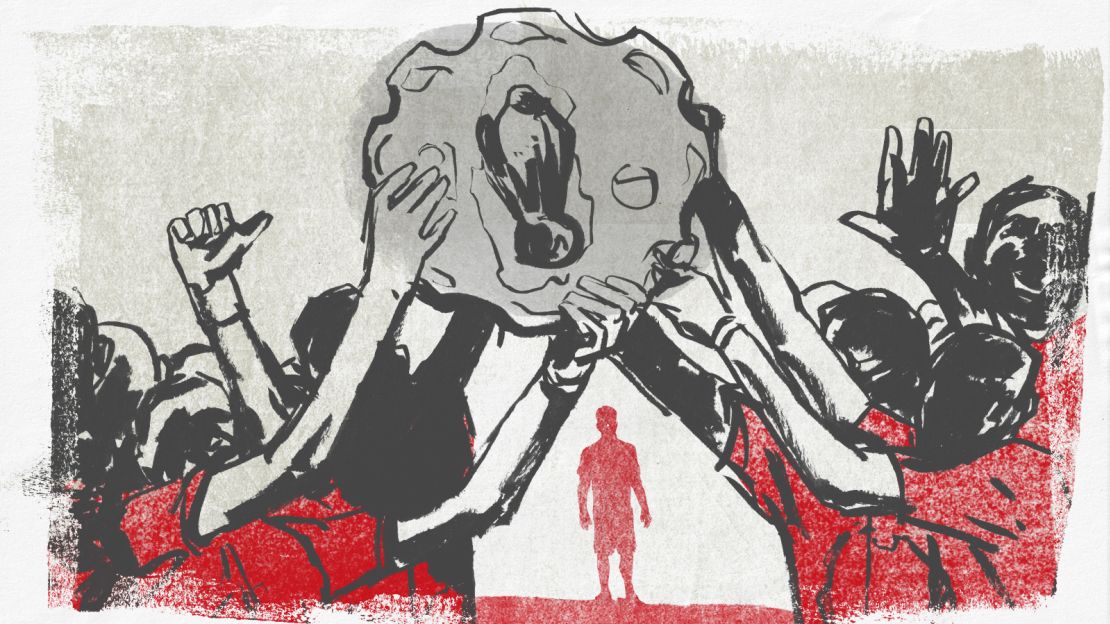
The then 21-year-old Han threw his hands up in the air as he and his Al-Duhail teammates lifted the Qatar Stars League trophy, wearing a red t-shirt that read: “CHAMPIONS.”
It would be the last time soccer?fans would see Han play a professional game. By the time the new season kicked off the following month, Han was gone – no longer?in the starting line-up nor on the bench, with no news emerging of any transfer.
Months passed without any update regarding Han’s whereabouts until a?UNSC final report of the Panel of Experts?released in March 2021?confirmed that the player’s contract had been terminated with Al-Duhail?earlier that year?and he was deported?from?Qatar.
CNN has reached out to Al-Duhail and Qatari authorities for comment but did not hear back immediately.
However,?as the world entered the second full year of the Covid-19 pandemic in 2021, North Korea kept its borders sealed and restricted all persons and goods coming into the country out of fear of the virus.
Kim Jong?Un?even fired several senior officials?in 2021?who failed to enforce the country’s stringent Covid-19 prevention efforts.?The resulting tough border shutdown left Han stranded.
Han?boarded a Qatar Airways flight from Doha on January 26, 2021, when he was deported,?according to?a letter attached in the?UNSC’s final report of the Panel of Experts. However, with no home to return to, the flight took Han back to Rome, an official familiar with the matter confirmed to CNN Sport.
“I know his management took him back to Italy. I think he’s still there, but he can’t?play more?football?… It was very unlucky for him to not be still playing and improving,” Han’s former coach Andersen?told?CNN.
CNN has reached out to the Italian foreign ministry and FIFA but did not hear back immediately.
The surprising soccer career of Han Kwang Song
Han was last reported to be living in an unspecified North Korean?embassy in 2021,?awaiting the resumption of flights back to Pyongyang,?according to another official close to the issue.
Choe, who had traveled to Italy with Han, was still in the country in 2021 “due to the suspension of international flights to enter the DPRK,”?according to the UNSC’s final report of the Panel of Experts.
The official added that some North Korean embassies have been accommodating the country’s nationals unable to return home as the borders remain closed, with “some housing?many tens [and more] of North Korean nationals in long-term ‘transit’ in accommodation blocks.”
A South Korean government official told CNN Sport that despite the UN sanctions, “more than 100,000 North Korean workers are staying in some 40 countries, mainly in China and Russia,?earning more than $200 million to $300 million in foreign currency annually.”
While his status remains the subject of speculation, for Canzi and Andersen, it is the fading of Han’s dreams of playing for a celebrated soccer club – solely for his circumstance of birth – which is perhaps the biggest shame.
“It will not be easy to come back at that level, but it’s possible. If he has a chance to come back, it’s a very good motivation … Of course, it would have been a good career and good money, so it’s a waste,” Canzi said.
“[For] almost two years, he [hasn’t] played soccer, I think he’s only been training with a small team, I don’t know which, but he [isn’t] playing soccer. So, he’s lost a lot of his quality,” Anderson said regretfully.
“I’m very sorry for him that he had to stop playing soccer. He was such a big talent.”



